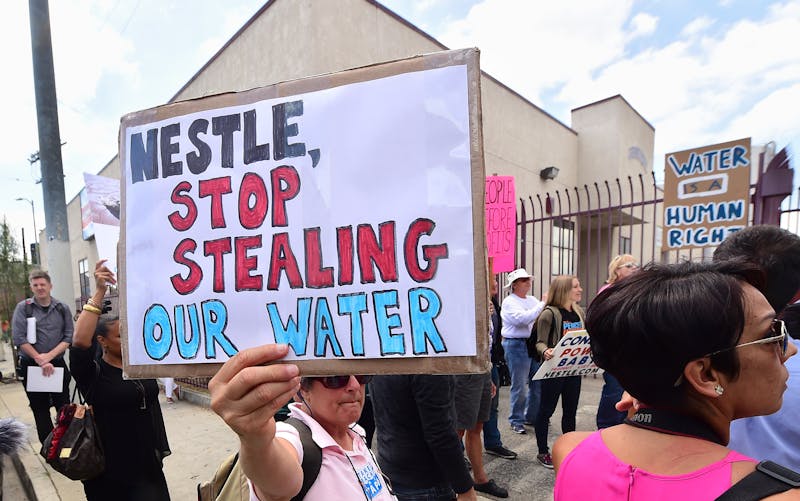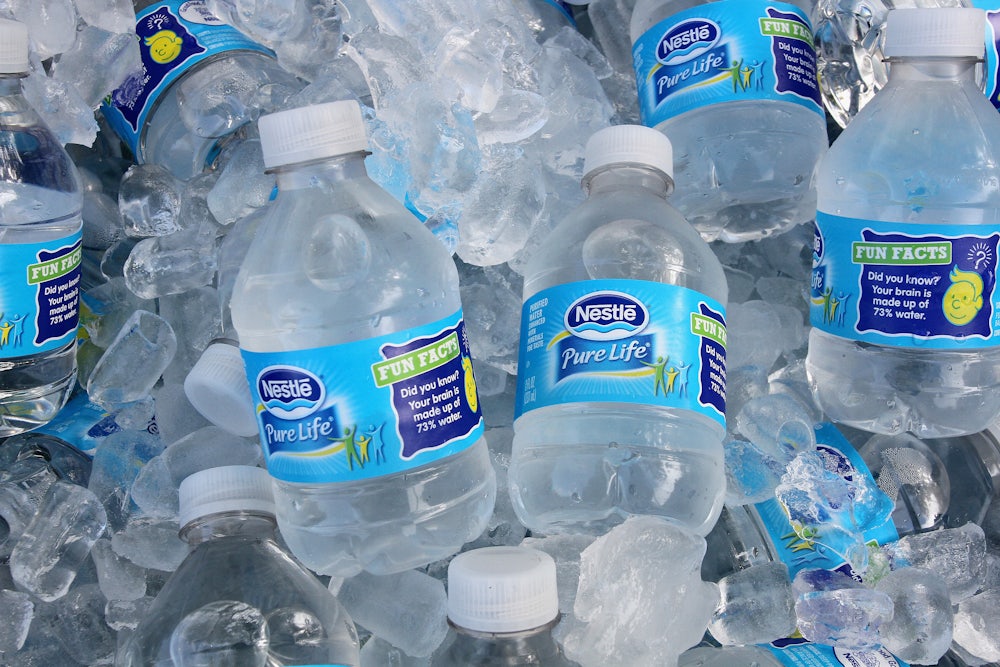President Donald Trump signed an executive order last week that aims to unravel former President Barack Obama’s environmental legacy and may torpedo America’s promises under the Paris Agreement to help reduce global warming. In an implicit rebuke of Trump, some of the country’s richest companies issued statements reaffirming their commitment to fighting climate change.
“We believe climate change is real and the science is well accepted,” General Electric CEO Jeff Immelt wrote in a blog post to his employees. “Climate change is one of our most significant global challenges and strong action is critical to meeting the serious threat posed by greenhouse gas emissions,” declared a coalition of tech giants. Nestlé, the world’s largest food company, noted (correctly) that the impacts of global warming could threaten its profits: “Our company’s success ultimately depends on our ability to reliably source high-quality crops and other raw materials.” General Mills said that moving away from coal and investing in clean energy would be “key to unlocking new business growth potential for the US and around the world.”
Prominent environmentalists rejoiced on Twitter.
A massive "you're wrong" to #Trump on #climate change, from #Google, #Apple, #Microsoft, and #Amazon, collectively worth around $2 trillion. https://t.co/CfiU0n1Y0v
— Peter Gleick (@PeterGleick) March 30, 2017
.@POTUS’s attacks on efforts to #DefendClimate contradict what huge companies actually want. https://t.co/7mTdwpDUJZ
— Moms Clean Air Force (@CleanAirMoms) March 31, 2017
Nation's biggest tech companies (and major employers) get climate change. They are not OK with Trump's Climate Destruction Plan. https://t.co/tA27xPeXT8
— David Doniger (@ddonigernrdc) March 31, 2017
To some on the left, nothing is more satisfying than hearing a bunch of billion-dollar corporations tell Trump that he’s wrong—and for good reason. While Trump has boasted that his executive order will help the U.S. economy, some of the economy’s biggest players say it makes more sense for businesses to reduce carbon emissions and promote clean energy. The White House claims it’s not even aware that climate change poses a threat to businesses.
This is literally the White House admitting it is "not familiar" with the economic impacts of climate change. Think about that for a second. pic.twitter.com/0beNTOmggE
— Emily Atkin (@emorwee) March 28, 2017
But liberals should check their glee. Anodyne statements about climate change are a cheap and easy public-relations victory. None of the above corporations indicated that they would fight Trump’s order; none even mentioned Trump or his executive order at all. They merely said they’d continue their own attempts to reduce carbon emissions, because it’s good for business. Such rhetoric isn’t new. As The New York Times notes: “Corporations, especially those with strong consumer brands, have been increasingly responsive to customer and shareholder concerns about climate change.” Over the years, these businesses have signed pledge after pledge to reduce carbon emissions; some have even filed amicus briefs in court to defend Obama’s Clean Power Plan.
Moreover, not all of these companies are environmental heroes in their own right. Amazon, for instance, has been widely criticized by environmental groups for avoiding transparency about its own carbon emissions. It is currently the largest U.S. company by market value to refuse to disclose its carbon footprint to the CDP, formerly known as the Carbon Disclosure Project. According to the Seattle Times, Amazon hasn’t responded to CDP’s inquiries since 2010. By contrast, Amazon’s biggest tech competitors are all disclosing their energy consumption levels, and doing a pretty good job—Google, Microsoft, and Apple all received “A” grades in 2015 for making “strong actions to mitigate climate change.” Amazon received an “F.” The company’s “fast-expanding warehouse and logistics operations, as well as its power-hungry data centers, could become growing sources of carbon emissions,” the Seattle Times wrote.

Nestlé is the largest bottled water company in the world. As it pontificates about the importance of environmental stewardship, it continues to fight environmental groups in court over its practice of extracting millions of gallons of water from drought-stricken regions of California. Nestlé also still employs Peter Brabeck, a climate denier, as its chairman. “Climate change is an intrinsic part of the development of the world,” he said in 2014. “Since the world has existed we have had climate changes and we will have climate change as long as the world exists.... For me the issue is more about what can we do in order to adapt to climate change and perhaps to try to gain more time.”
Duke Energy, a veritable coal giant, raised some eyebrows when it vowed to “continue to move forward” in reducing carbon emissions despite Trump’s executive order. But this is the same company that’s constantly being cited for violating environmental regulations; that’s been fighting tooth and nail against accusations of polluting drinking water in North Carolina; and that has made six-figure contributions to ensure that Republicans who deny climate change maintain their Senate majority.
Many of these companies are making important strides to reduce their environmental footprints. Nestlé has some frankly aggressive goals to reduce its greenhouse gas emissions by 2020, as does General Electric. Amazon is taking steps to power many of its data centers with renewable energy. Google says it will reach 100 percent renewable energy for its global operations this year. Apple CEO Tim Cook has openly said climate change deniers who disagree with his strategy to cut carbon emissions should disinvest from the company.
But such steps don’t make these companies moral heroes. They are acting in response to consumer pressure. For a decade, poll after poll has shown that Americans want to shop sustainably, and that they’ll pay more for products that market themselves that way. Consumers also hate waste and environmental abuse. One recent poll found that two-thirds of consumers will avoid a brand they perceive to be hurting the environment. So when companies release generic, politically timely statements about how much they care about climate change, they’re doing it less out of concern for the planet than for their bottom line. The good news is that this empowers consumers to vote with their dollars. Buy American, sure. But more importantly, buy from American companies whose press releases are backed up by their practices.
